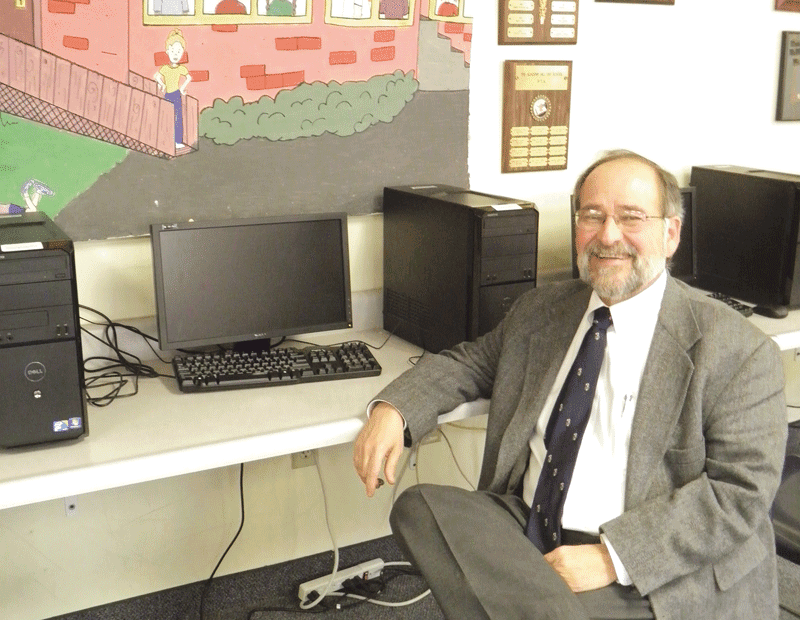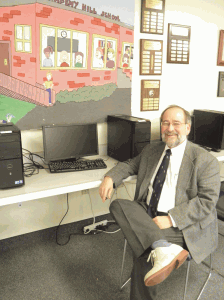
Creative Concepts
Head of Academy Hill School Plans to Change the Way Students Learn

Stephen Edele has ambitious plans to institute an inquiry-based learning program to promote students’ interest in what they are learning.
The newly appointed head of school wants to change the way students learn so that, in addition to succeeding academically, they become fully invested in and enthusiastic about all aspects of their education.
Although that may seem idealistic, Edele’s 40-year track record of instituting similar change proves it’s possible in an independent educational setting.
Academy Hill School caters to gifted and talented students, and Edele’s appointment last summer is a dream come true for the educator/administrator who has spent the majority of his career working in independent schools. He is glad to be back in New England after heading schools on the West Coast, and is excited to begin working on several goals he has set.
“When you talk about teaching bright kids, the assumption is that they learn faster than others,” he explained. “Most of the time it’s true, and while it is important to make sure the pace is appropriate, we can’t lose sight of the other side of learning, which is depth. We want to make sure that our students take the information they learn and apply it in ever-increasing levels of complexity by using it to solve problems with real-world applications.”
The school has 110 students in kindergarten through grade 8 who come from cities and towns across Western Mass. and Connecticut. And although many small, independent schools have experienced difficulties in recent years, Edele said Academy Hill has remained strong and continues to grow. He credits its success to the fact that “we have stayed absolutely true to our mission. We are a school for bright kids and don’t try to be anything other than that. We have done well by recognizing our niche and holding on to it.”
Edele has plans to take Academy Hill to new heights. One of his goals is to define the way technology is used in the classroom. Another is to develop a holistic program based on inquiry-based learning, which is an instructional method developed during the 1960s. It differs from traditional learning, which requires students to memorize material. Instead, it is an active form of schooling, where progress is measured by how well students develop experimental and analytical skills rather than by how much knowledge they possess.
“The teacher becomes more of a coach, instead of just being a fount of information,” Edele said. “The heart of it is about learning, then using the information to think critically and solve problems. Our job is to teach students how to be successful in the world on many different levels, and I am absolutely convinced that inquiry-based education is the best way of preparing them to enter the world. It allows students to be directly involved in their own learning and needs to be at the heart of what we are doing, not just an add-on.”
History Lessons
Edele brings a wealth of experience to his new position. “I have been through so much with so many kids and parents, you would have to try really hard to surprise me with something,” he said.
His career began in the early ’70s when he was hired to teach high-school English in a West Philadelphia public school. “It was a wonderful position; I learned a lot and got along well with the students,” he said, adding the majority of students were African-American and Vietnamese. “It was a fairly tough neighborhood, but that’s not what sent me scampering,” he told BusinessWest.
He said he felt a lot of pressure to conform, and when Edele was ordered to terminate an afterschool theater program he had begun, he made the decision to leave. The students had asked him if he would start the program because they hoped to stage a few small productions.
“I felt as if I were a puppet on a string. I had absolutely no say over what or how I taught,” Edele said, adding that he was teaching a class of ninth-grade gifted students.
His next stint was at the Pennington School in New Jersey, which catered to students in grades 6 through 12 via a boarding and day program. “I fell in love with the place and was there for 20 years. It was one of the first schools in the country with a program for kids with diagnosed learning differences,” he said.
Edele taught middle-school students in the school’s Center for Learning and discovered he loved working with the age group. “I really believe middle school is our last real chance to influence students in terms of who they will become. They are just beginning to separate from their parents and form their own identity and begin to think for themselves, but they have no idea how they will fit in the world,” he said, acknowledging that working with students of this age is a “roller-coaster ride, as their emotions are all over the place as they face enormous peer pressure.”
Edele believes schools have an obligation to educate the whole child. “It’s not just about making them the best in math, but about making them the best person they can be. It doesn’t just happen by itself, and it’s important for adults to guide students in how to make the right decisions,” he said.
He held a wide variety of roles at the Pennington School, including a stint as its first director of residential life, teaching advanced-placement courses, heading the middle school, then the upper school, coaching baseball and football, and directing middle-school plays.
“I loved it there until I had my own kids. And by 1995 I was itching to head my own school,” he said. So, he took a job at a facility in rural Virginia, then moved two years later to the Pegasus School in Huntington Beach, Calif., which catered to gifted and talented students.
Three years later, was recruited as head of the Harborside School in San Diego, a private school for students in preschool through grade 8. Seven years later it closed after losing a major benefactor, but Edele helped transition it into a charter school, then moved to a school on Vashon Island in Puget Sound, which was a 15-minute ferry ride from Seattle.
Although he and his family were attracted to the idea of life on an island, he found it isolating, and after three years, “I had the great fortune to end up here.”
But along the way, he learned many things, and one of the most important is how well inquiry-based learning works. He instituted the teaching method at the Harborside School and found the results were astounding.
Edele will never forget a project undertaken there by middle-school students. It was an election year in the U.S., and the students were tasked with learning Mexican history.
So the teachers divided the classes into two political parties and set up their own school election. One party supported a fictional candidate named Cortez, and the other supported a candidate named Montezuma.
The students did everything in their power to woo voters. They conducted research, used history from real-world politics to make their points, held debates, and developed comprehensive advertising campaigns within a budget.
Edele doesn’t remember who won that election, because the candidates were not real. But he does remember the effect it had. “The students were actually engaged in learning rather than reading about the subject in a textbook,” he said. “It was fun, and they will remember it forever. The old ways of teaching — reading a textbook and answering questions at the end of a chapter — are simply dull and boring and will certainly kill any child’s enthusiasm for learning. It’s important to keep them excited and engaged so they are active participants in their own learning, not passive recipients of information.”
Textbook Examples
Edele’s history has made him realistic about the time and energy it takes to bring a new style of teaching to a school.
“It’s not going to happen overnight. And I want to be absolutely certain that parents understand what I am trying to do and how and why new and different ways of teaching will benefit their kids. I also want to make sure that the faculty has all of the resources they need,” he said, adding that the staff will have to become fully grounded in inquiry-based learning.
But he knows it will add value to the Academy Hill program. “There isn’t another school in the Pioneer Valley with the same mission,” he said. “And what we’re going to do is the best way to prepare students for life after Academy Hill and beyond. Our students are bright, curious, and gifted, and this is our niche.”





